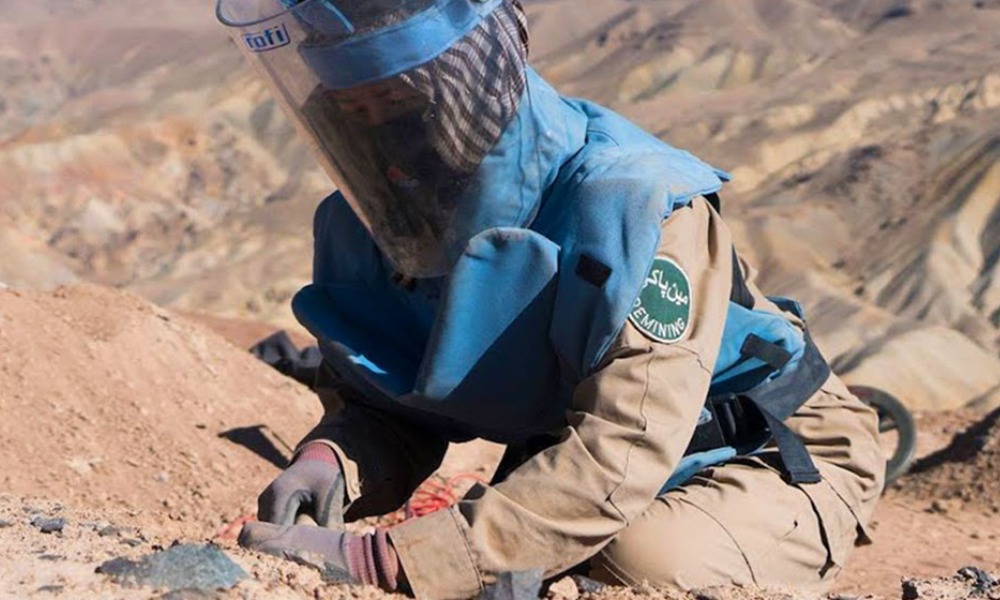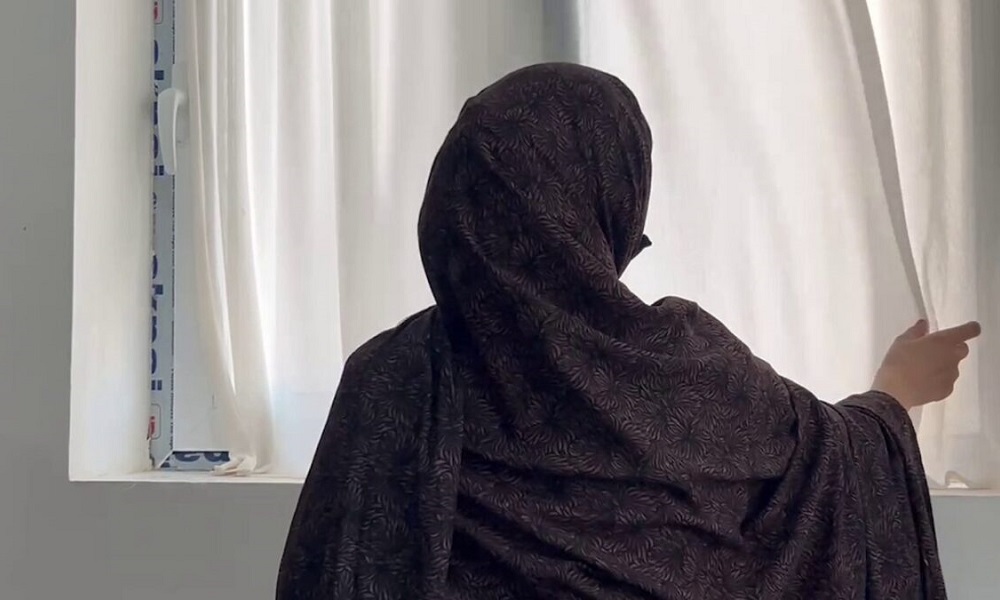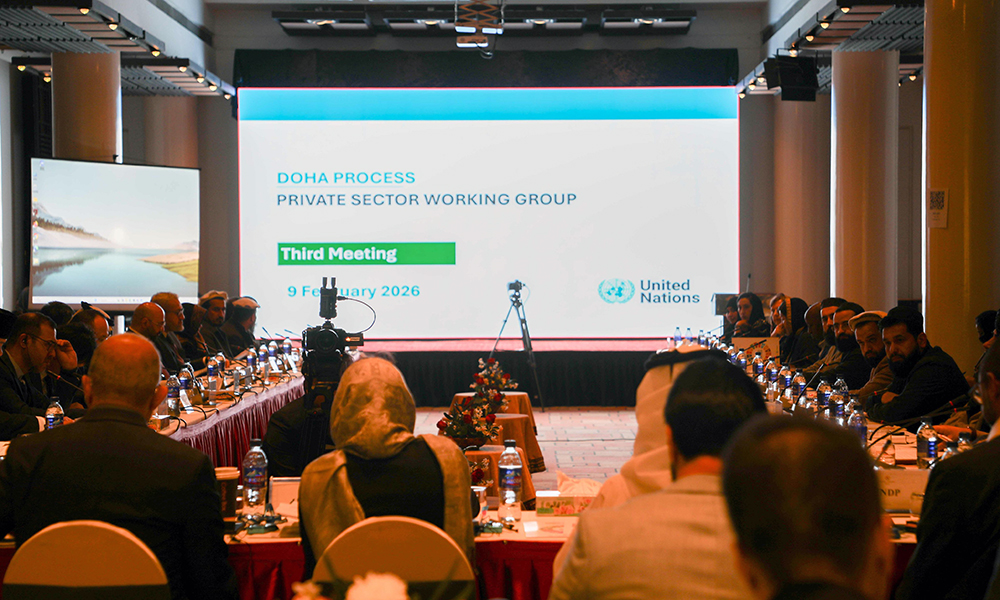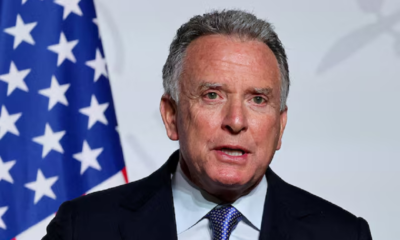Latest News
Afghan woman putting her life at risk to rid her home of mines

The UK Embassy in Kabul says that over 1.6 million Afghans have received mine risk education and more than 30 km2 of productive land have been also cleared of mines and unexploded ordnance (UXOs) in the last three years to save lives and promote agriculture.
Marking the Mine Awareness Day, the British Embassy stated with the UK has been providing support to United Nations Mine Action Service (UNMAS) in the last three years, aimed at helping the war-torn country manage mine clearance operations.
Fezeh Rezaye, a 26-year-old mother of two, is a member of a 19-strong, all-female demining team, honored for their efforts by the Arms Control Association, which awarded them the Arms Control Person International Award in 2019.
Rezaye explains that how a tragic incident led her to put aside her ambition to be a teacher, and take up a risky demining job instead.
“I had known several people from my village who have been injured or killed by mines in Bamyan. Even our landlord lost his leg in a landmine accident. But it was the death of seven children, all from the same family in our village that really affected me. They had been together in the mountains when they were all killed by a mine explosion. I thought about my own children, that this could have happened to them,” said Rezaye.
Before joining demining team Rezaye was teaching literacy to rural women in Bamyan province. She says that everyone including his family disagreed with her decision to become a deminer.
“My friends and family, including my children, disagreed with my decision to become a deminer. I would tell them that, for the sake of my future and for my children, I wanted Bamyan to be free from mines so that everyone can study and enjoy life,” Rezaye said.
Most families in Afghanistan look at this job as dangerous and risky work and are not welling their daughter’s life.
Rezaye also speaks about threats and challenges against her job in the country.
“I am concerned about my job security because, once these are cleared, I may not be able to work in other provinces, many of which are dominated by the Taliban,” said Rezaye.
Rezaye says that she is also interested in completing a master’s in sociology or archaeology.
Rezaye and her female demining team were the first female deminers team in Afghanistan.
“Winning the Arms Control Award made a big difference for me and the team. After we won, we were recognized by Afghan society and became idols for many women. We were the first female demining team in Afghanistan, and we proved that women can work as hard as men, that we are equal to them, she added.
More than three decades of armed conflict in Afghanistan has left a sorry legacy, with mines, and other explosive remnants of war, contaminating the country. Since 1989, the Mine Action Programme of Afghanistan (MAPA) has been working to clear this dangerous material but, with the conflict still ongoing, some 120 civilian mine-related casualties are recorded every month, and it is considered unlikely that the target of declaring the country free from mines will be reached.
Although explosive remnants of war remain on some firing ranges, Bamyan was declared mine-free since 2019, making it the first mine-free province in Afghanistan, following years of demining work that saw explosive devices removed from some 27,012,116 square meters of contaminated land with explosive devices.
But, in general, Bamyan society is more open than other parts of the country: this is a poor province, with high unemployment, and demining is one of the few opportunities for women to earn money.
As of 2020, Afghanistan is one of the countries most affected by landmines and explosive remnants of war (ERW) in the world. Around 32,000 hazardous areas have been cleared or otherwise canceled since 1989, yet some 1,495 communities remain affected by explosive ordnance (EO) to this day.
Over 38,000 explosive ordnance casualties have been recorded since 1979 (2,090 women, 2,322 girls, 14,646 boys, 19,590 men) of which almost 10,000 resulted in death and more than 29,000 in injuries.
In recent years, improvised explosive devices (IEDs) have become one of the leading causes of civilian casualties in the country.
In 2019 alone, explosive ordnance contamination resulted in 1,692 casualties (143 girls, 122 women, 716 boys, 711 men), resulting in 650 deaths and 1,042 injured victims. The accidents were almost entirely caused by ERW and improvised mines (IM).
Men and boys tend to be killed and injured at a far higher rate than women and girls. Numbers for all groups at least doubled in 2014-2019 compared to 2008-2013, largely due to a sharp increase in IM casualties.
Latest News
Economic Commission approves national policy for development of agriculture

At a regular meeting of the Economic Commission chaired by Mullah Abdul Ghani Baradar, Deputy Prime Minister for Economic Affairs, the National Policy for the Development of the Agriculture and Livestock Sector was approved.
According to a statement from the deputy PM’s office, the key objectives of the policy include the mechanization of the agriculture and livestock sector; development of agricultural, irrigation, and livestock research and extension systems; management of irrigation systems; support for investment in these sectors; and ensuring public access to high-quality agricultural and animal products.
During the same meeting, the development plan for the fish farming sector was also approved.
Under this plan, through private sector investment, 7,700 small, medium, and large fish production and farming facilities will be established on 6,500 hectares of land in various parts of the country.
The statement added that the implementation of this plan will create direct employment opportunities for 50,000 people and indirect employment for 250,000 others.
Latest News
Afghan authorities prevent three forced marriages in Balkh, Kunar, and Parwan

Officials from Afghanistan’s Ministry for Virtue and Vice successfully intervened to stop three cases of forced marriage in the provinces of Balkh, Kunar, and Parwan, protecting women’s rights under Islamic law.
The cases involved families attempting to marry off their daughters against their will. After registering and reviewing the complaints, ministry officials acted swiftly to halt the marriages.
The families were summoned and advised on the importance of respecting women’s rights and the freedom to choose a spouse. Following the intervention, they pledged that all future marriages of their daughters would occur only with the women’s full consent.
The ministry said the actions reflect its ongoing commitment to safeguarding women’s rights and enforcing Islamic principles across Afghanistan.
Latest News
Doha process private sector meeting highlights growth and coordination in Afghanistan
The session was divided into two segments, focusing on growth and inclusion in the first part, and coordination and transparency in the second.

The 3rd session of the Doha Process Private Sector Working Group was held both in-person and online at Kabul’s Grand Hotel, hosted by the United Nations Assistance Mission in Afghanistan (UNAMA).
The meeting brought together representatives from the Islamic Emirate of Afghanistan, including the Ministries of Foreign Affairs, Finance, Industry and Commerce, Economy, Labor and Social Affairs, and the Central Bank, alongside UNAMA, UN agencies, international and regional organizations, as well as ambassadors, diplomats, and private sector experts.
The session was divided into two segments, focusing on growth and inclusion in the first part, and coordination and transparency in the second.
Afghanistan’s Islamic Emirate representatives shared achievements and progress since assuming governance, while participants acknowledged these efforts and highlighted their ongoing support for the private sector. All parties offered recommendations to address challenges and emphasized enhanced cooperation moving forward.
-

 Latest News3 days ago
Latest News3 days agoAfghanistan to grant one- to ten-year residency to foreign investors
-

 Sport4 days ago
Sport4 days agoIndonesia shock Japan to reach historic AFC Futsal Asian Cup final
-

 Sport3 days ago
Sport3 days agoIran clinch AFC Futsal Asian Cup 2026 in penalty shootout thriller
-

 Latest News3 days ago
Latest News3 days agoAfghanistan says Pakistan is shifting blame for its own security failures
-

 International Sports2 days ago
International Sports2 days agoWinter Olympics gain momentum as medal table takes shape
-

 Latest News5 days ago
Latest News5 days agoAfghanistan facing deepening hunger crisis after US Aid Cuts: NYT reports
-

 World5 days ago
World5 days agoUS, Ukraine, Russia delegations agree to exchange 314 prisoners, says Witkoff
-

 Latest News3 days ago
Latest News3 days agoTraffic police receive new cars
























